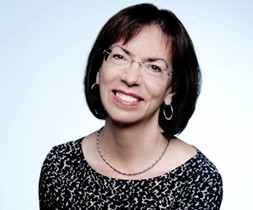

Peggy Wallace, managing partner of Golden Seeds and member of the board of directors at Cognition Therapeutics
May 23, 2018 Golden Seeds is focused on investing in the vibrant opportunities of women-led companies. As such, we work with many talented, passionate female entrepreneurs who are doing truly remarkable things. Our “How Did She Do It?” series shares the stories, challenges and successes of the women behind the companies of Golden Seeds.
Golden Seeds is focused on investing in the vibrant opportunities of women-led companies. As such, we work with many talented, passionate female entrepreneurs who are doing truly remarkable things. Our “How Did She Do It?” series shares the stories, challenges and successes of the women behind the companies of Golden Seeds.
Today, Peggy Wallace, managing partner of Golden Seeds, interviews Susan Catalano, chief scientific officer and founder of Cognition Therapeutics.
Below, they discuss how Susan founded Cognition Therapeutics and the company’s mission to help solve one of the world’s biggest epidemics, Alzheimer’s disease.
SC: Cognition was founded in 2007 to discover and develop drugs that could protect the brain synapses (the point of electrical communication between two brain cells) from the toxic beta-amyloid oligomer proteins that build up in the brain and lead to memory failure in patients with Alzheimer’s disease and other neurodegenerative diseases. We searched through our proprietary collection of drug candidates to find one that stopped the toxic proteins’ negative impact on brain cell synapses in the petri dish in our lab in Pittsburgh.
We tested these drug candidates to see if they could stop memory loss in mice that were genetically engineered to have Alzheimer’s disease. One of these drug candidates (CT1812 or Elayta™) stopped memory loss completely and restored brain cell synapse numbers to normal. We then gave Elayta to mild to moderate Alzheimer’s disease patients for the first time in a Phase 1b/2a clinical trial that was completed at the end of last year. We were encouraged to see evidence that Elayta reduced the damage to brain cell synapses.
As brain synapses are damaged by the toxic proteins that build up in the brains of patients with Alzheimer’s disease, scientists know that concentrations of damaged synapse proteins gradually rise in the cerebrospinal fluid that bathes the brain. We think this is because so many synapses are damaged that the protein debris exceeds the brain’s capacity to digest it, so the damaged proteins are shipped out of the brain into the cerebrospinal fluid. In our clinical trial, the placebo-treated patient had an increase in the concentration of damage proteins in the cerebrospinal fluid, and the Elayta-treated patients had a decrease in the concentration of damage proteins in the cerebrospinal fluid. The difference between the two groups was statistically significant. This was very encouraging, because it confirmed our prior studies and indicated that Elayta might be protecting synapses in Alzheimer’s patients’ brains.
We are now testing Elayta in a series of Phase 2 studies to confirm these findings in larger numbers of Alzheimer’s patients in the U.S. and Australia, and soon in the EU.
SC: We are devoted to solving one of the world’s biggest health crises: Alzheimer’s disease. Alzheimer’s disease is the most common dementia, affecting one of every 10 people over age 65 and nearly 35 percent over age 85. This translates into more than 5.4 million Alzheimer’s disease patients in the U.S. alone, a number expected to reach 9 million by 2030 and 16 million by 2050 as the U.S. population ages. Patients in the later stages of Alzheimer’s disease require nearly full-time care, resulting in an economic burden in excess of $260 billion annually. This economic burden is expected to increase to more than $1 trillion by mid-century. It is simply not sustainable for our society.
Our company has gone from an idea to testing a drug in patients as a result of about $35 million in equity investments — almost entirely from angel investors such as Golden Seeds — and approximately $20 million in grants from the National Institute of Aging (NIA). I believe that the way we have funded our company, in partnership with committed angel investors, is a new model for funding innovative approaches to intractable diseases that fits the very definition of impact investing.
SC: Any drug development effort is extraordinarily challenging. We’ve been blessed with an excellent pool of talent — specifically in neuroscience — and a low cost of operations in Pittsburgh, which has made the task of drug development surmountable.
However, we still face significant challenges. Unlike other major diseases such as cardiovascular disease or cancer where you have seen incremental improvements in treatments over the last three decades, there have been very few successes in Alzheimer’s and nothing that can stop the disease. We were again lucky to identify a dedicated and insightful group of investors who believe in the value of our research and its potential to make a meaningful improvement in the lives of millions of people.
As we move forward, we will undoubtedly face new and different challenges, but I am confident that the team of executives, advisors and investors we have fostered will allow us to weather those, as well.
SC: 2018 will be a milestone-filled year for Cognition, during which we will be initiating at least three clinical trials. Two of these clinical trials will help further elucidate Elayta’s mechanism of action. One of these trials, which is being funded by a new $4.2 million grant from NIA, is being undertaken in conjunction with researchers at Yale University to directly measure whether Elayta can stop the loss of synapses in the brains of Alzheimer’s patients. The second mechanism of action trial, which is being funded by a new $2.4 million grant from NIA, will look at Elayta’s ability to remove the toxic beta-amyloid oligomers from the brain and clear it into the cerebrospinal fluid. Our third study, which should start in the second half of the year, will help us determine Elayta’s safety over a longer dosing period in a larger group of Alzheimer’s disease patients.
SC: Don’t be afraid to fund your company with angel investors. Angel investors who are committed to your company, your research and your innovation can make all the difference. Be sure to view them as partners, not just investors. Their insights and expertise are invaluable.
Also, acknowledge the skills that you don’t possess and hire executives with those skills to share the challenges of drug development with you. This is especially important for entrepreneurs who hail from academia, which is an environment where you are solely responsible for your lab and research projects.
Lastly, I would advise founders to be prepared to evolve. As programs advance in the clinic, there will be a need to build out your leadership teams, seek additional capital, and increase your visibility. There is a comfort in remaining small, but to succeed, you need to be learn to be uncomfortable as your company grows and evolves.
SC: We would not exist as a company were it not for Golden Seeds. Their members took the time to understand our ideas and our scientific approach, they shared the vision of our novel approach to the disease, and they saw and embraced the potential that our drug candidate has to treat this terrible disease in a novel way. Golden Seeds had the courage to fund innovation in a field that is nearly devoid of success and has stood with us as we built the company. Without the support of these seasoned professional angel investors, we would not be about to advance this drug into Alzheimer’s patients and be on the brink of realizing the enormous value we have created.
For more wisdom like this from other amazing female leaders, follow Golden Seeds on Twitter.